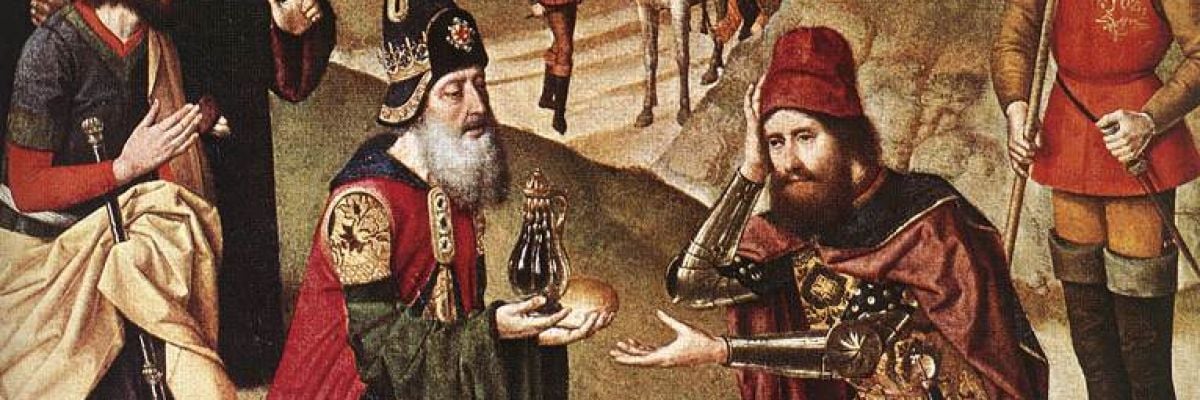
It is a rare occasion when I find a Catholic who has not been approached by a Fundamentalist or Evangelical with Matthew 23:9: “And call no man your father on earth, for you have one Father, who is in heaven.” How could the Bible be any clearer that we ought not to call priests “father”?
In response, Catholic apologists frequently point to the parable of the rich man and Lazarus in Luke 16:19–31, in which Jesus himself calls Abraham “father.” But some Protestants think they’ve found ways around it. Here are some of their arguments along with ways we can respond.
Back to Earth
1. Many insist that we Catholics are missing the point of Jesus’ statement in Matthew 23:9. Jesus said that we are to call no man on earth “father.” Abraham was dead, so he was not on earth any longer. Therefore, they say, it’s okay to call him “father.”
A good place to start in this discussion is Ephesians 6:2–4:
“Honor your father and mother” (this is the first commandment with a promise), “that it may be well with you and that you may live long on the earth.” Fathers, do not provoke your children to anger, but bring them up in the discipline and instruction of the Lord.
Paul called someone on earth “father,” so it is clear that in Matthew 23 our Lord was not forbidding the term father with reference to anyone on earth in any sense.
Take Me to Your Leader
2. Some may respond at this point that it’s okay to call your male parent “father,” but it is not okay to call religious leaders “father.” This interpretation does not work either, because religious leaders are called “father” in Scripture as well. Listen to the words of our Lord in Luke 16:24:
And he [the rich man] called out, “Father Abraham, have mercy upon me, and send Lazarus to dip the end of his finger in water and cool my tongue; for I am in anguish in this flame.”
Abraham was certainly a religious leader, yet Jesus called him “father.” And Jesus is not alone here. James calls Abraham “father” in James 2:21, and Paul refers to Abraham as “father” seven times in Romans 4:1–18. John refers to the leaders of the Church as “fathers” twice:
I am writing to you, fathers, because you know him who is from the beginning. I am writing to you, young men, because you have overcome the evil one. I write to you, children, because you know the Father. I write to you, fathers, because you know him who is from the beginning (1 John 2:13–14).
John is not referring to fathers of families and their physical progeny. The context makes this obvious. The entire epistle is addressed to “my little children,” and John repeats this phrase seven times throughout its five chapters (2:1, 12, 18, 28; 3:1, 7; 5:21). The fathers are the priest/elders of the community, while the “little children” are the laity in general or perhaps newer converts. We don’t want to say that John wrote this epistle to toddlers!
Spiritual Fatherhood
3. I once had a lengthy discussion with a Baptist pastor who claimed that Abraham’s fatherhood was not spiritual in nature; it was physical. Therefore, he said, it’s okay to call him “father” just as a physical father is called “father.” The problem with this theory is not only that Abraham is called “our forefather according to the flesh” in Romans 4:1, but he is specifically referred to as “the father of all who believe without being circumcised” in Romans 4:11. Paul refers to him as “the father of us all”—i.e., the father of all Christians—repeatedly in Romans 4:1–18. Most Christians are not physically descended from Abraham, yet he is still called our spiritual father.
Title Fight
4. Perhaps the most common objection to calling priests “father” is stated succinctly by Eric Svendsen, who refers to 1 Corinthians 4:15 (“For though you have countless guides in Christ, you do not have many fathers. For I became your father in Christ Jesus through the gospel”):
Catholic apologists, seeing in this passage support for the Catholic practice, claim that Paul here confers on himself the title “Father.” But this is simply not the case. . . . Just because Paul claims to be a father to the Corinthians, it does not thereby follow that he took on the title “Father” (much the same way that a teacher does not necessarily take on the title “Teacher”) (Evangelical Answers: A Critique of Roman Catholic Apologists, Reformation Press, 167).
First of all, Jesus never said, “Don’t give anyone the title father.” He said, “Call no man your father.” But more importantly, we have multiple examples of the word father being used as a title in the New Testament. If we understand title as it is defined in the dictionary as “an appellation of dignity, distinction, or pre-eminence as titles of office, distinction, degree, etc.,” then we see several such examples:
- Stephen, “a man full of faith and of the Holy Spirit” (Acts 6:5), refers to both Abraham and the elders of Jerusalem with the same appellation of distinction—father: “Brethren and fathers, hear me. The God of glory appeared to our father Abraham” (Acts 7:1–2). So obviously, what is okay for Abraham is okay for elders in the community.
- In 1 Corinthians 4:14–15, Paul refers to himself as “father”:
I do not write this to make you ashamed, but to admonish you as my beloved children. For though you have countless guides in Christ, you do not have many fathers. For I became your father in Christ Jesus through the gospel.
- “And [Lazarus] called out, Father Abraham, have mercy upon me” (Luke 16:24). Here we have the title of father being used of Abraham. This title is repeated often in Scripture. Paul calls Abraham “our father Abraham” (Rom. 4:12).
“Spiritual Birth”
5. Svendsen further claims that only those who are “directly responsible for the . . . spiritual birth” of a believer can rightly be called “father.” Paul could then be called “father” in 1 Corinthians 4:14–15 because he is directly responsible for the spiritual birth of the Corinthians.
Yet this interpretation fails as well. Stephen called all of the elders he was addressing “father” in Acts 7, but it is unlikely that all of these men were “directly responsible” for Stephen’s spiritual birth. Further, take a look at John’s epistle. John, writing most likely to all of the churches of Asia Minor, refers to himself as their “father”; he calls them his “little children.” But Paul was directly responsible for the spiritual birth of some of these believers, especially in Ephesus. So unless we understand John to be contradicting Matthew 23:9, we must discount Svendsen’s argument.
What Was He Talking About?
6. For our final point, we need to answer the obvious question: What was Jesus speaking about in Matthew 23:9? The translation of Ephesians 3:14–15 given in the Confraternity Edition of the Bible gives us some important insight related to this question:
For this reason I bend my knees to the Father of our Lord Jesus Christ, from whom all fatherhood (Greek: patria, “fatherhood”) in heaven and on earth receives its name.
God the Father is our one, true Father. All other fathers—whether biological or spiritual—participate in God’s unique fatherhood and represent it to us. They neither take away nor add to the one, unique fatherhood of God. Indeed, they establish God’s fatherhood on earth by way of participation.
The context of Matthew 23:9 emphasizes the sin of pride among the scribes and Pharisees. They loved to be called “teacher,” “father,” or “rabbi.” But their pride pointed men to themselves rather than to God the Father, from whom they received true fatherhood and from whom all true fatherhood is derived. Other than God the Father, there are no fathers at all in the truest sense of the term. But there are usurpers who bring upon themselves the condemnation of our Lord.
Help from a Protestant Friend
The Baptist pastor I mentioned before rejected my claims from Ephesians 3:14 because he maintained that the Greek word patria does not mean “fatherhood.” He said this was “a bad translation from a decidedly Catholic Bible.” Patria, he claimed, simply means “lineage” or “family” and has nothing to do with fatherhood at all.
The truth is that, although the Greek word patria does mean “lineage,” it can mean more than just that. And it’s obvious that it does so here in Ephesians 3:14–15. St. Jerome, the greatest Greek and Hebrew scholar in the history of the Church, translated the word in the Vulgate as paternitas (“fatherhood”). Athanasius, an eastern Father who was fluent in Greek—as was Jerome—understood it this way as well (see Four Discourses against the Arians 1:23).
But perhaps even more important for our discussion here is A. Skevington Wood, a well-respected Protestant scholar:
There is more to be said for the possibility that pasa patria should be taken as “all fatherhood,” recognizing the fatherhood of God as the archetype of every other kind of paternity (Expositor’s Bible Commentary, Zondervan, vol. 11, p. 51).
It is the context of Ephesians 3:14–15 that brings out the usage of the word. Paul first tells us that God is Father (patera) and then that all fatherhood (patria) derives from and participates in this fatherhood. It’s a play on words. Coupled with Matthew 23:9, this text helps us to see most poignantly that Jesus condemns the usurpation of the fatherhood of God, not participation in that same fatherhood.



